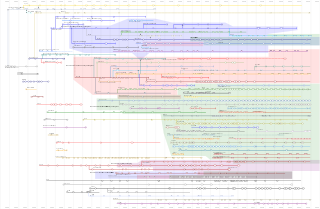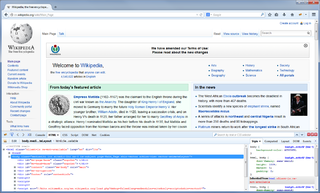
Internet Explorer is a discontinued series of graphical web browsers developed by Microsoft and included in the Microsoft Windows line of operating systems, starting in 1995. It was first released as part of the add-on package Plus! for Windows 95 that year. Later versions were available as free downloads, or in-service packs, and included in the original equipment manufacturer (OEM) service releases of Windows 95 and later versions of Windows. New feature development for the browser was discontinued in 2016 in favor of new browser Microsoft Edge. Since Internet Explorer is a Windows component and is included in long-term lifecycle versions of Windows such as Windows Server 2019, it will continue to receive security updates until at least 2029. Microsoft 365 ended support for Internet Explorer on August 17, 2021, and Microsoft Teams ended support for IE on November 30, 2020. Internet Explorer is set for discontinuation on June 15, 2022, after which the alternative will be Microsoft Edge with IE mode for legacy sites.

Scalable Vector Graphics (SVG) is an XML-based vector image format for two-dimensional graphics with support for interactivity and animation. The SVG specification is an open standard developed by the World Wide Web Consortium (W3C) since 1999.
Gecko is a browser engine developed by Mozilla. It is used in the Firefox browser, the Thunderbird email client, and many other projects.

Mozilla Firefox, or simply Firefox, is a free and open-source web browser developed by the Mozilla Foundation and its subsidiary, the Mozilla Corporation. It uses the Gecko rendering engine to display web pages, which implements current and anticipated web standards. In 2017, Firefox began incorporating new technology under the code name Quantum to promote parallelism and a more intuitive user interface. Firefox is available for Windows 7 and later versions, macOS, and Linux. Its unofficial ports are available for various Unix and Unix-like operating systems, including FreeBSD, OpenBSD, NetBSD, illumos, and Solaris Unix. It is also available for Android and iOS. However, the iOS version uses the WebKit layout engine instead of Gecko due to platform requirements, as with all other iOS web browsers. An optimized version is also available on the Amazon Fire TV, as one of the two main browsers available with Amazon's Silk Browser.

Avant Browser is a freeware web browser from a Chinese programmer named Anderson Che, which unites the Trident layout engine built into Windows with an interface intended to be more feature-rich, flexible and ergonomic than Microsoft's Internet Explorer (IE). It runs on Windows 2000 and above, including Windows 8, Windows 8.1 and Windows 10. Internet Explorer versions 6 through 11 are supported.

A browser war is competition for dominance in the usage share of web browsers. The "First Browser War," during the late 1990s, pitted Microsoft's Internet Explorer against Netscape's Navigator. Browser wars continued with the decline of Internet Explorer's market share and the popularity of other browsers including Firefox, Google Chrome, Safari, Microsoft Edge and Opera.

The following tables compare general and technical information for a number of web browsers. For further references, a browser support matrix is a table of support of a Webpage by browsers.

Netscape Browser is the eighth major release of the Netscape series of web browsers, now all discontinued. It was published by AOL, but developed by Mercurial Communications, and originally released for Windows on May 19, 2005.

Minimo was a project to create a version of the Mozilla web browser for small devices like personal digital assistants and mobile phones.
Mozilla Firefox has features that allow it to be distinguished from other web browsers, such as Chrome and Internet Explorer.

Windows Internet Explorer 7 (IE7) is a web browser for Windows. It was released by Microsoft on October 18, 2006, as the seventh version of Internet Explorer and the successor to Internet Explorer 6. Internet Explorer 7 is part of a long line of versions of Internet Explorer and was the first major update to the browser since 2001. It was the default browser in Windows Vista and Windows Server 2008, as well as Windows Embedded POSReady 2009, and can replace Internet Explorer 6 on Windows XP and Windows Server 2003, but unlike version 6, this version does not support Windows Me, Windows 2000, or earlier versions of Windows. It also does not support Windows 7, Windows Server 2008 R2 or later Windows Versions.

Microsoft has developed eleven versions of Internet Explorer for Windows from 1995 to 2013. Microsoft has also developed Internet Explorer for Mac, Internet Explorer for UNIX and Internet Explorer Mobile respectively for Apple Macintosh, Unix and mobile devices. The first two are discontinued but the latter runs on Windows CE, Windows Mobile and Windows Phone.

Mozilla Firefox 3.0 is a version of the Firefox web browser released on June 17, 2008, by the Mozilla Corporation.

Firebug was a discontinued free and open-source web browser extension for Mozilla Firefox that facilitated the live debugging, editing, and monitoring of any website's CSS, HTML, DOM, XHR, and JavaScript. It is now inbuilt in Firefox.

Internet Explorer 9 or IE9 is a web browser for Windows. It was released by Microsoft on March 14, 2011, as the ninth version of Internet Explorer and the successor to Internet Explorer 8, and can replace previous versions of Internet Explorer on Windows Vista, Windows Server 2008, Windows 7 and Windows Server 2008 R2 but unlike version 8, this version does not support Windows XP and Windows Server 2003. It and older versions of Internet Explorer are no longer supported. Microsoft released Internet Explorer 9 as a major out-of-band version that was not tied to the release schedule of any particular version of Windows, unlike previous versions. It is the first version since Internet Explorer 2 not to be bundled with a Windows operating system, although some OEMs have installed it with Windows 7 on their PCs, as well as new Windows 7 laptops.

Mozilla Firefox 4 is a version of the Firefox web browser, released on March 22, 2011. The first beta was made available on July 6, 2010; Release Candidate 2 was released on March 18, 2011. It was codenamed Tumucumaque, and was Firefox's last large release cycle. The Mozilla team planned smaller and quicker releases following other browser vendors. The primary goals for this version included improvements in performance, standards support, and user interface.

Mozilla Firefox 3.5 is a version of the Firefox web browser released in June 2009, adding a variety of new features to Firefox. Version 3.5 was touted as being twice as fast as 3.0. It includes private browsing, has tear-off tabs, and uses the Gecko 1.9.1 engine. It was codenamed Shiretoko during development, and was initially numbered Firefox 3.1 before Mozilla developers decided to change the version to 3.5, to reflect the inclusion of a significantly greater scope of changes than were originally planned. It is the last major version to support X BitMap images.

Firefox for iOS is a free and open-source web browser from Mozilla, for the Apple iPhone, iPad and iPod Touch mobile devices. It is the first Firefox-branded browser not to use the Gecko layout engine as is used in Firefox for desktop and mobile. Apple's policies require all iOS apps that browse the web to use the built-in WebKit rendering framework and WebKit JavaScript, so using Gecko is not possible. Firefox for iOS supports Firefox Sync and is able to sync Firefox's browsing history, bookmarks, and recent tabs.
The project that became Firefox today began as an experimental branch of the Mozilla Suite called m/b. Firefox retains the cross-platform nature of the original Mozilla browser, using the XUL user interface markup language. The use of XUL makes it possible to extend the browser's capabilities through the use of extensions and themes. The development and installation processes of these add-ons raised security concerns, and with the release of Firefox 0.9, the Mozilla Foundation opened a Mozilla Update website containing "approved" themes and extensions. The use of XUL sets Firefox apart from other browsers, including other projects based on Mozilla's Gecko layout engine and most other browsers, which use interfaces native to their respective platforms. Many of these projects started before Firefox, and probably served as inspiration.
















